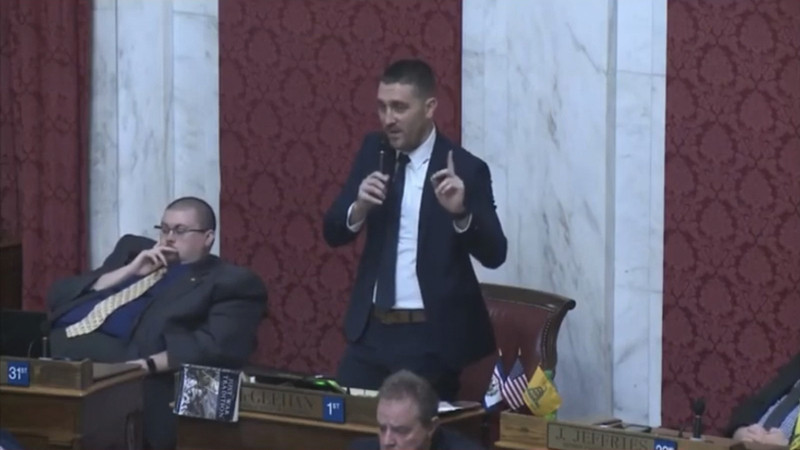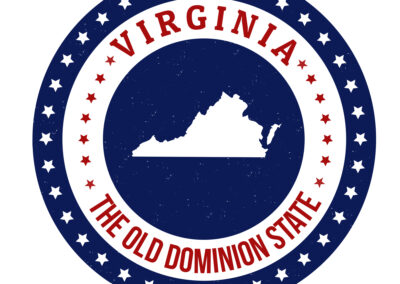Del. Pat McGeehan (R-Hancock) has served in the West Virginia House of Delegates from 2008 to 2010 and 2014 to present. Since 2015 he has been the primary sponsor of the Defend the Guard Act in his state, which would prohibit the West Virginia National Guard from being deployed into active combat without a declaration of war by Congress, as required by Article I, Section 8 of the U.S. Constitution. This speech was given on the House floor on February 2, 2022. You can watch the entire speech here or read a complete transcript below.
Thank you Mr. Speaker. I’ll be brief. I just wanted to address the body quickly here about something that I’ve noticed that is a larger phenominon not just within our state but in the country as a whole. And I feel that it’s very surreal. It’s a very surreal phenominon for me, and I think many of you probably sense it too.
We are quickly approaching a post-constitutional era within our country and within several other states. Let me give you an example. Anybody been following the news recently, over in Europe? There’s about 100,000 Russian regulars on the border of the Ukraine. Right now it seems as if the president of the United States, by unilateral action, is as of this morning’s news, considering sending something like 40,000 troops into Eastern Europe to confront some sort of skirmish along the Ukrainian border that, really, we have no deep understanding of.
Why do I say that we’re living in this post-constitutional era though? The legislature and the Congress hasn’t been consulted. There’s been no consideration of some sort of declaration of war. We’re moving closer and closer to a dangerous predicament in Eastern Europe. All because of one man, who has this unilateral power, this authoritarian power, to essentially do whatever he wants. Is that how the original understanding of the American tradition of government was supposed to sort of conclude?
We don’t have to really look any further than our own state capital. Because for two years now we’ve also seen this post-constitutional order here in Charleston. I learned in the 8th grade in civics class that the legislative branch was the exclusive branch that made laws. Well for two years now that hasn’t been the case. For two years now that exclusive power has been usurped by the executive branch. The executive branch now claims that they too can issue laws or things that have the effect of law. Maybe it hasn’t been exercised as much as in other states but there to my knowledge has been no concessions of political power within the executive branch of our own state capital.
Now just think, if that’s happening here, think about the rest of the country and what’s going on in the various states there. Think about Washington DC. You know, this is a very scary notion, that we are moving, if we haven’t crossed the rubicon yet, it seems we are about to. Now see the Constitution, which we all raise our right hands and swear on the Bible to uphold and defend, it doesn’t have any meaning unless we embody the essence of its meaning within ourselves and it lives within ourselves and we carry that out. And I feel that we are, many of us, not just in this chamber but many people, have given up on that idea for one reason or the next.
What comes next? What comes next in this post-constitutional, new order? I’m not sure. But it seems we’re headed in that trajectory. There’s this famous, probably the most famous philosophical dialogue, many of you probably read it, Plato’s Republic. And if you remember, the old character that went toe to toe with Plato’s Socrates named Thrasymachus, what was his definition of justice? Well justice just belongs to the stronger. Which basically is reduced to justice equals might is right. We have objective principles embodied in these constitutional orders that we swear to uphold that create an objective morality, an objective virtue, an objective form of justice. Going forward, do you want to live in a world, this nihilist, this proto-Nietzschen, Thrasymachus world where might equals right? Or do you want to live in a world where we have the rule of law, where we have the checks and balances, the separation of powers? Do we want to reclaim that? Do we want to prevent this trend, this very dangerous trend, from moving across the rubicon (if it’s not too late already) and try to do something about it in our little corner of the world and push back?
And that’s what we really need to do. We have legislative leaders, but they need to act as leaders of the legislative branch. Leaders of the legislative branch, in the traditional sense, must be jealous of the legislative powers that are exclusive to our branch. What I mean by that, it means they have to safeguard the law-making powers. And sometimes there’s not going to be much of a compromise. Sometimes in rational debate there is no middle position. It’s a contest of wills. The law-making powers belong to us, not to the executive branch, the same way the law-making powers belong to the U.S. Congress and not to the president. And if you ignore that, and the Constitution just becomes a piece of paper and it no longer lives within us to defend, very dangerous consequences come about, not just in the short term but for the long term of our society.
We really need to take a stand and do something about it within our control, even if it’s going to cost us some points with other people in the building; we might not be able to get some favors here and there. We have to sacrifice for this higher goal. We must do something about this, otherwise it’s a foregone conclusion that we’re going to head down the same sort of trend here and the American tradition, basically, will go by the wayside sooner or later.
I went a little bit longer than what I planned on, but I’m going to be pushing forward a few bills. One is the emergency powers bill to try to restrain the executive branch and try to reclaim the proper role the legislature has over the law-making authority.
And two, there’s a reason why I’ve been introducing this so-called “Defend the Guard Act” for so many years. It’s precisely because of the situations that we can foresee coming about, say in the Ukraine. How do we have National Guardsmen that are able to stay here, back up hospitals, respond to emergencies, natural disasters, if those guys are sitting over there protecting the eastern border of the Ukraine? How is that even in the American national security interest? Do we really want to see our West Virginia boys and girls going over to some war Biden wants to get us into against the Russians? I’m not sure it’s going to turn into a hot war, I don’t know. Do we really want to risk that? We need to return to the old way, the old republic, objective morality, and we need to reclaim a constitutional order and we need to do it from our corner of the world. And that’s all I’m asking. Consider what I’m saying. That’s all I have, Mr. Speaker.





